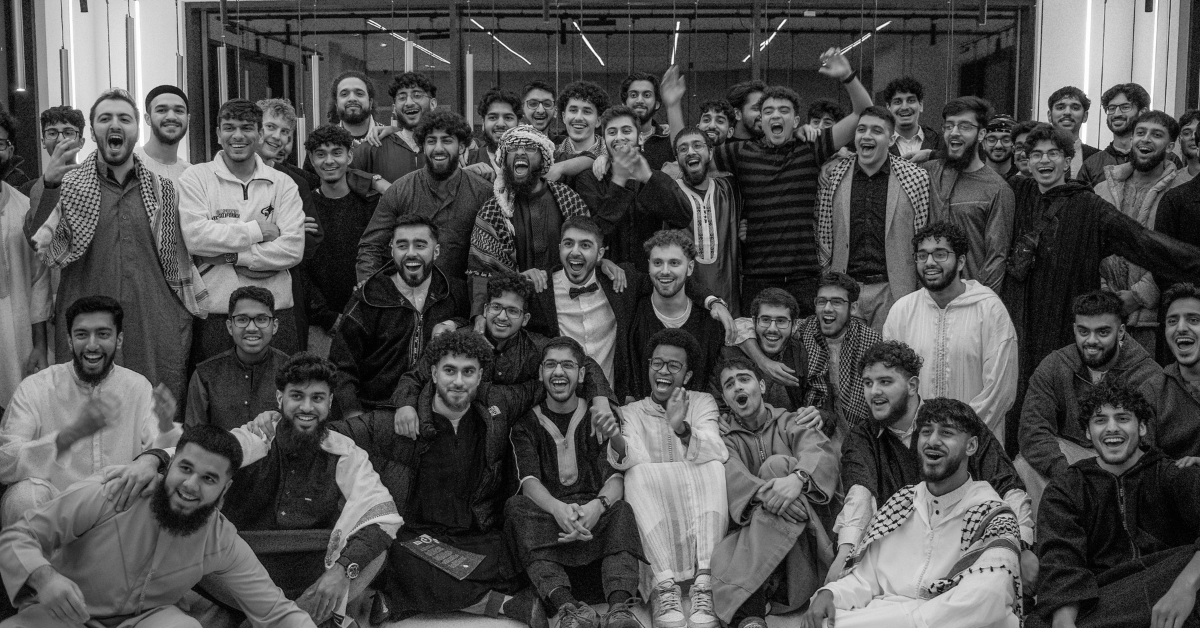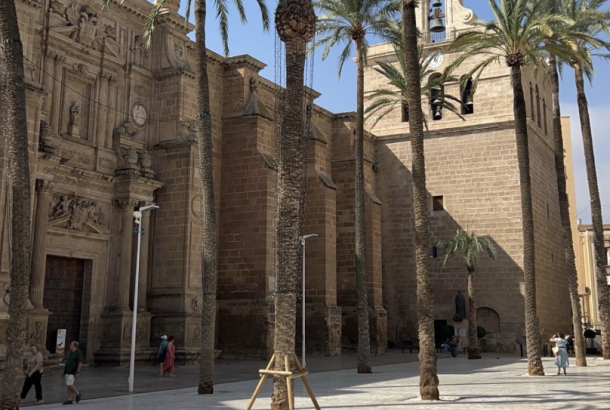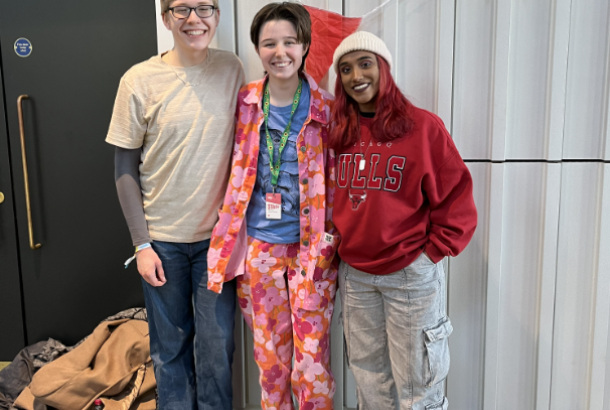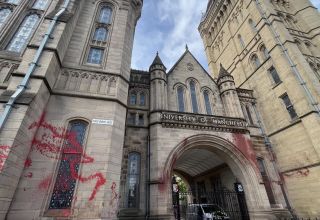In conversation with Islamic Society: “Here for ourselves, and here for everyone else as well”
By Jacob Robinson and Alexandra Baynes

The Islamic Society (ISoc) is not only the largest society at the University, but likely one of the most active, hosting around 10 events every week. This sees upwards of 1,000 students interact with the society on a weekly basis.
The Mancunion sat down with Eyaan Arshad, ISoc’s President, who is the “external face” and head representative of the society, and Maike Stockfisch, Head of Publicity, who is responsible for the society’s outreach efforts, to find out more about the society which – outside of its members – may be relatively unfamiliar to much of the student body.

History
Founded in 1962, the Islamic Society is one of the oldest societies at the University. In fact, it’s become a miniature ecosystem in its own right; the structure and functioning of ISoc is commendably detailed. With committee meeting minutes from the last ten years on their society Intranet, it remains a model example of how to organise a society. It has to be, given the typical turnout for the society’s diverse array of events – consisting of socials, classes, and activities.
The society was founded to “advocate for Muslims”, offering an open, inviting space for Muslim students to share their faith and interact with others.
The Committee
It goes without saying running a society on this scale requires an efficient committee. For Eyaan, “having a clear structure and clarity is a very important thing.”
ISoc has four tiers within their committee structure – the President and two Vice Presidents, the Board of Directors, Team Leads, and finally members of each team. In total, ISoc has 60 members on their committee, making it one of the largest society committees in the University as well.
They meet weekly on a Monday for two hours, with Eyaan praising his team for their dedication; like any society, “it only works if people are passionate.” But for him, “the society and the committee give us an identity and purpose”, and this is what matters the most.
Eyaan added that it’s crucial “everyone on the committee has their own remit.” With student burnout a common issue amongst those on committees, it’s particularly important to ensure that everyone can strike a place between their degree and other commitments.
The committee hasn’t always been structured in this way and that “it’s the prerogative of who’s in charge.” However, it’s clear that remodelling the committee has allowed ISoc to function more smoothly.
Handovers were another point of conversation, with Eyaan explaining that it feels like a “continuous handover,” especially as the last president remains in the picture to support the new committee. One significant challenge societies face is establishing continuity and ensuring there are students prepared to assume crucial responsibilities in the following academic year.
But for ISoc, this isn’t so much of an issue. Like the SU Executive Officer team, the main committee also has a retreat during the summer, to set objectives for the upcoming academic year and strengthen bonds within the committee.
The Society
Back in 1962, ISoc was created for students, by students – and the same sentiment exists for the University of Manchester’s estimated 6,000 Muslim students today.
Eyaan described how, in Islam, there is “such a focus on catering for people” – supporting others, feeding others, helping others – which ISoc not only does individually, but on a “University-scale” too. The heart of the society lies in the fact that it is “here for ourselves, and here for everyone else as well.”

The number of events ISoc holds every single week means that its outreach is extensive. Maike explained the popularity of their Roots Academy classes, which delve into the stories and histories of Islam, amassing hundreds of students across Manchester every Tuesday. Another popular event is their Friday social at McDougall Prayer Hall, which sees another 300-400 students turn up to socialise, eat (free!) food, and play games. They also host talks about current affairs at these socials. Maike stressed that “everyone is invited” to these events, and it’s “just a really nice and inclusive atmosphere”. All students are welcome to come to the events, even if it’s just for the food!
Outreach
A common assumption, as Eyaan highlighted, is that ISoc is exclusively for those who practice Islam. “When you say Islamic society, I think perhaps the first thing that comes to mind is, it’s just for Muslims, which is half the truth.”
“We put such a big emphasis on how we treat people, indiscriminate of their religion.”
Nevertheless, “Islam is encompassing of everything.” As such, the work ISoc does in the local community, whether that be working with other societies, other faith groups or volunteering, is not just for the sake of community engagement. “A lot of community work we don’t see as community based or charity work – this is all Islam for us.”
In line with the tenets of Islam, ISoc has a reputation of being a “very charitable society,” conducting extensive work in the local community, including work with women’s shelters, refugee organisations, and youth clubs. In the past year, they say they have raised between £90,000-£100,000.

Their stalls outside the Students’ Union – which raise funds for charity via students’ favourite medium, food (cookies, samosas, mango lassi) – raise alone between £500 to £1,000 a week.
Despite these high-reaching figures, and unlike other societies, ISoc doesn’t charge for membership. Their income is generated via their community outreach work, which Maike is responsible for publicising, yet they do also plan to “make a loss on purpose.” Their income is also generated by their work with local businesses, creating a funding model which is based on the premise of ‘get out what you put in.’ Whilst ISoc is appreciative of the generosity of external parties, Eyaan acknowledges that the “real cost is our time and effort.”
Religion on campus
The society emerged due to an “intrusiveness of the environment for Muslims” around the time it was founded. This included a lack of halal food, places to pray, even things for Muslims to do. The very presence of the society therefore creates a collective voice for those who practice the faith on campus.
Even so, whilst Eyaan acknowledged that ISoc largely advocates for Muslims, “we also provide a safe space for anyone who might seek refuge in it.”
You might think that a lack of halal food around campus would be a problem for Muslim students. A quick look at the food vendors available on campus suggests that the University and Students’ Union lacks a sufficient range of such options. But Eyaan acknowledged that “we’re surrounded by restaurants” – the clue is in the name with the Curry Mile – which allows the University a “cop-out.” For 6,000 students, halal food isn’t necessarily available on campus, but it is within walking distance of the University.

McDougall Prayer Hall, located behind the Students’ Union, Manchester Academy, and the Main Library, is a “unique thing [ISoc] have in Manchester”. Many other universities don’t have such large prayer spaces. Eyaan was keen to stress how grateful the society is to have that space, emphasising that the prayer hall “has carried people through university”, with the majority of ISoc’s activities held there.
Eyaan told us there has been talk since before Covid-19 of closing this space, but the University would only do so when it provides “an equal space elsewhere”. He believes the University “has already made their mind up about closing the space”.

The society has a close working relationship with teams in the Students’ Union. ISoc is particularly grateful for the Executive Officer team. Eyaan told us “especially this year they have been a big help.” The team actively listen to the concerns of the committee and members, advocating on their behalf. He has sat in on meetings with the University’s members of staff: the Director for Equality, Diversity and Inclusion, the Vice President for Social Responsibility and Vice President for Student Experience, all thanks to the Executive Officer team.
His appreciation extends to other staff members too: “We have a lot of appreciation particularly for the bookings team.” Not a surprise given the number of events ISoc host.
Accommodation
In the same way that halal food and prayer spaces are barriers Muslim students contend with at University, accommodation is another issue. Their faith requires them to be separated by gender in some spaces, yet out of the University-owned total of 22 halls, only two are gender-segregated. Maike empathises that this “is not ideal for Muslim women.”
University has a renowned (and stereotyped) culture of students drinking, smoking, and partying – much of which originates in halls. For many Muslim students, this is something which is prohibited. Maike states this side of student life is “not the best environment for those who avoid this scene for religious or personal reasons.” Maike explains a further issue arises in the University’s lack of a tiered preference system for accommodation, which isn’t “ideal.”
This has led to the society taking matters into their own hands, creating an “ISoc village” where they aim to get landlords to rent their houses to Muslim students specifically. ISoc also has created an accommodation guide, and group chats to find roommates with “fellow sisters or brothers.” Yet the emphasis is not on what the University has, but how ISoc has negotiated their way around it, with Eyaan stating that this is “the price you pay to be a Muslim, to hold onto your faith”, something which is “tough for people.”

Legacy
For Eyaan and Maike, ISoc is at the core of their time at University. Maike says that although the society requires a lot of her time, it’s “been very rewarding, and I think that’s what drives me.”
They jokingly summarise their roles at ISoc as a “full-time job next to a full-time degree” and spend their time “fire-fighting” trying to balance both, but it’s down to people like Eyaan and Maike that ISoc has been able to successfully continue for the past 62 years.
The sense of community, support, and friendship that ISoc extends towards not only Muslim students, but to students of other faiths too is a testament to how valuable ISoc is, both at the University and in the wider community of Manchester.
Follow the Islamic Society on Instagram and find more information about the society’s classes and events via their website.







